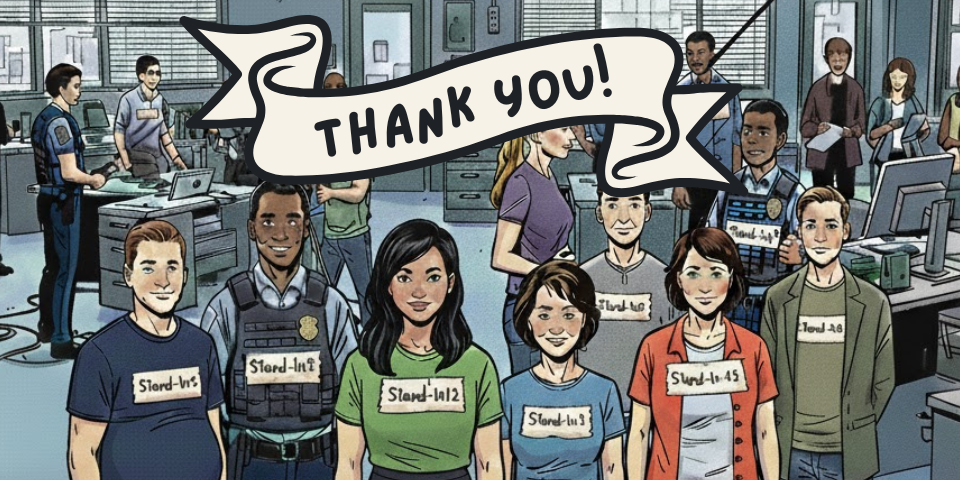So you want to stand in on television or films, and you want to do this kind of work regularly. How on Earth do you do that?
While there is no magic formula for becoming a sought-after, regularly working stand-in, it may help to build your reputation as a stand-in in order to book regular work. As you build your reputation as a stand-in, you may find that stand-in work comes more easily to you.
Here is some advice for building your reputation as a stand-in.
Stand in for the Length of a Project
When it comes to building your stand-in reputation, one long-term stand-in gig can go a long way toward that goal. If that project uses you every day for a month — or every day for several months — you cultivate relationships with AD teams and with casting directors that can lead to future stand-in work when it becomes available.
Contrast standing in on the length of a project with standing in a day or so here or there on one project — or on several different projects — and you’ll find it a little harder to develop your reputation and your relationships with crews and casting.
Stand in for Name Actors
A famous name may go a long way when you stand in for that actor. If you stand in for a famous actor, especially if that actor is the star of that project, you may find that that experience catapults your reputation as a stand-in. When the actor shoots another project where you work, you may find you’re the first person the new production calls when looking to book that actor’s stand-in.
It may be even better for your reputation if you stand in for a number of name actors on assorted projects. Doing say may lend extra credibility to your stand-in work, which in turn may build your stand-in reputation.
Be Reliable
When you are trying to build your stand-in reputation, it will got a long, long way with casting and with production if they can count on you.
This tends to mean that casting can have your assurance that you are available on the days you say you are, and that you return their calls promptly when they are lining you up for work.
This also tends to mean that you don’t show up late to set, so that production can use you right when the company is in. It also means that production can find you when they need you, and that you’ll do the job you were hired to do.
Contrast being reliable with being unreliable as a stand-in, and you may find it is harder to book future work as a stand-in when you are unreliable with casting or production. You may have harmed your relationship with casting or with an AD team if you’ve regularly made them have to work hard in order to work with you.
Be Responsible
If you are responsible as a stand-in, this trait will go a long way toward developing your stand-in reputation than if you are needy as a stand-in.
Standing in can be a challenging job at times. Stand-ins who can tolerate challenges develop their reputations probably faster than those stand-ins who have trouble tolerating challenges or have a lot of needs to care for when they are standing in.
Also, stand-ins who are responsible take care of themselves, and in so doing they seek out advance information so that they are prepared for the circumstances of their work. Responsible stand-ins will bring appropriate gear and clothing for stand-in work. In the face of no specific information from casting about what to bring or wear to set, they might seek out that information from production or from other stand-ins they know who are on their project. They take it upon themselves to figure out what is going on and taking care of their personal needs, rather than having production tell them what is going on and fulfilling their needs.
Stand-ins who aren’t responsible may suffer in challenging situations on set, or they may find that their neediness is a drain on production. They may also find their reputations as stand-ins take a hit.
Be Reasonable
Usually stand-ins are union members working under a collective bargaining agreement (CBA), which assures them safety and compensation minimums that productions must honor.
On set, sometimes circumstances fall between the cracks of the language of the CBA and need to be negotiated. An unreasonable stand-in might make demands or threats in the unusual situation on set, making claims about what should or shouldn’t happen without any specific precedent or rule. Essentially, the unreasonable stand-in doesn’t consider production’s interests and only considers his or her own in these situations, and as a result may become needlessly difficult to work with.
More reasonable stand-ins might recognize the unusual circumstances they are in on a particular production day and work toward a fair resolution in the matter, without excluding their personal interests or ignoring production’s interests. That is, they consider their own personal interests as well as production’s interests, and they work with production to make for a satisfying outcome for them both.
More reasonable stand-ins probably build their reputations faster than unreasonable stand-ins because they demonstrate that they are cooperative rather than competitive in the face of an obstacle on set.
Be Knowledgeable
That said, it helps to know your contracts, so you build your reputation as a stand-in if you are knowledgeable about the language of the CBA in which you work. When you’re knowledgeable, you may find that production turns to you for answers to questions about standing in, pay rates, pay adjustments, etc. But also, you build respect if you know what should happen in terms of your contract — you show that you aren’t someone of whom to take advantage. You’re serious about what you do.
While you probably won’t ever be considered the authority on any contract matter, the knowledgeable stand-in has the answers rather than lots of questions, meaning the knowledgeable stand-in doesn’t drain background PA or AD energy with questions about their stand-in work that day.
Be Seen on Sets
You know you’ve developed a reputation as a stand-in when others start to remark how frequently they see you standing in. If you’re at this place in your stand-in career, congratulations!
Continuing to be seen as a stand-in will solidify your outward reputation as a stand-in. As cast members and crew members continually see you as a stand-in on set after set, it may make it easier for you to land and keep stand-in jobs in the future.
It will also go a long way toward their trusting you should they work with you on future work. Production won’t feel as much need to babysit you as a stand-in because they know from past exposure to your work that you know how to do the job.
Do Your Job Well
It may go without saying that if you do your job well as a stand-in, you help to solidify your reputation as a stand-in. Contrast a regular stand-in who does the work well with the regular stand-in who doesn’t do the job well, and it may be that the stand-in who doesn’t do the job well has numbered days as a stand-in.
How best to learn how to do your job well as a stand-in? Reading Stand-In Central’s weekly Tips & Tricks Blog is one way! And if you’re new to standing in, The Stand-In Handbook is also a huge help.
Etc.
The above are some sound approaches toward building your reputation as a stand-in. Of course, building your reputation doesn’t happen overnight. Furthermore, your reputation is never so established that everyone knows you as a stand-in. There will continue to be experiences where you have to prove yourself again, and there may even be experiences where your reputation doesn’t serve in keeping your job. But if you have a solid reputation as a stand-in, you will probably be able to find future jobs even if the current stand-in job doesn’t work out.
Any other ways to build your reputation as a stand-in? How do stand-ins in your market build their reputations? Share your insights below!






Make a stand-in resume! This will show you are serious about the job. It’s a great way for a casting director to see what your experience is, and a helpful tool for them to pass on to production when they are considering stand-ins. I find that a stand-in resume is being requested more and more these days on high-profile projects. Check out this article on SIC about it – http://standincentral.com/2011/12/28/stand-in-resumes/
Excellent additional point, Sara!